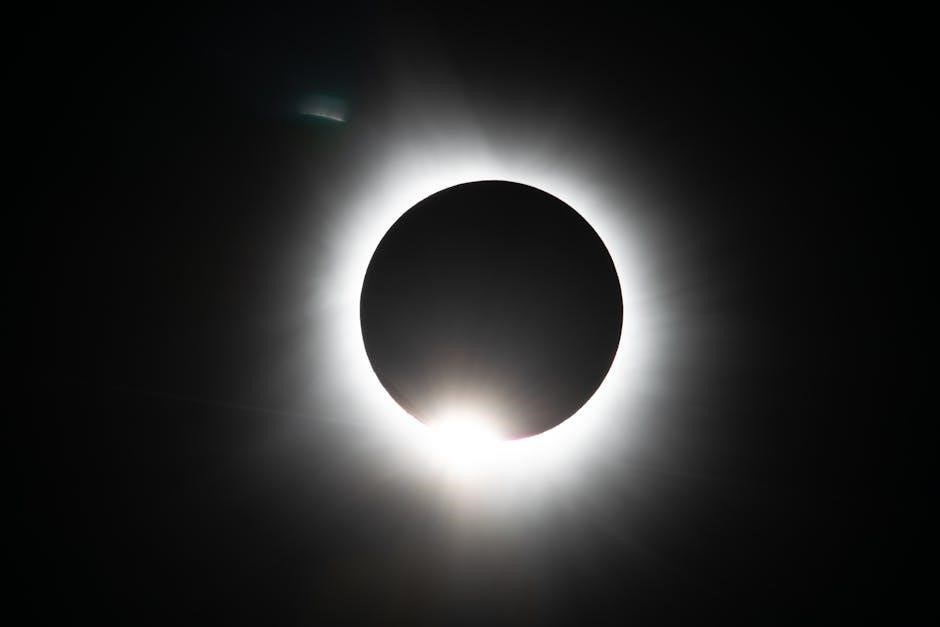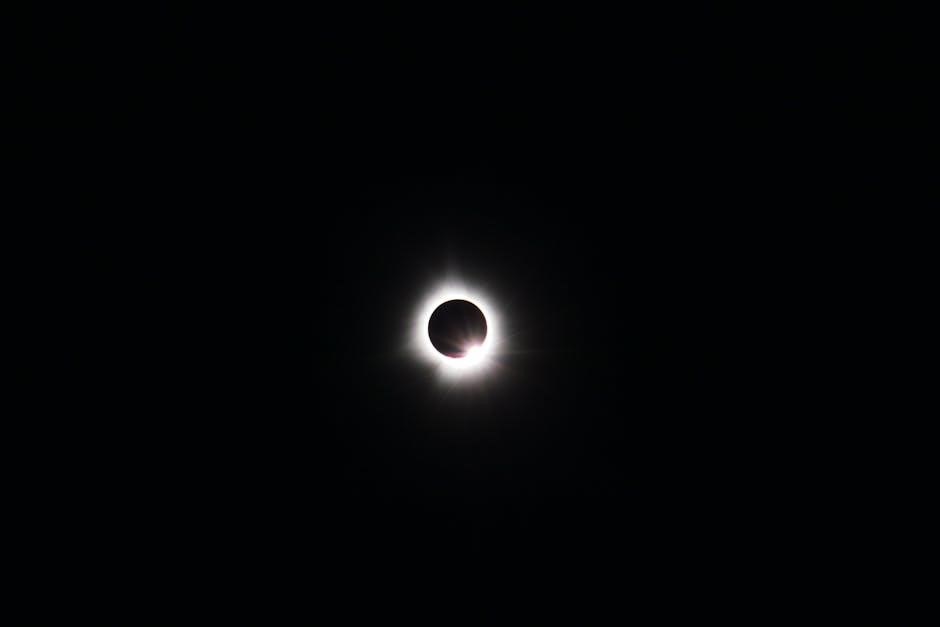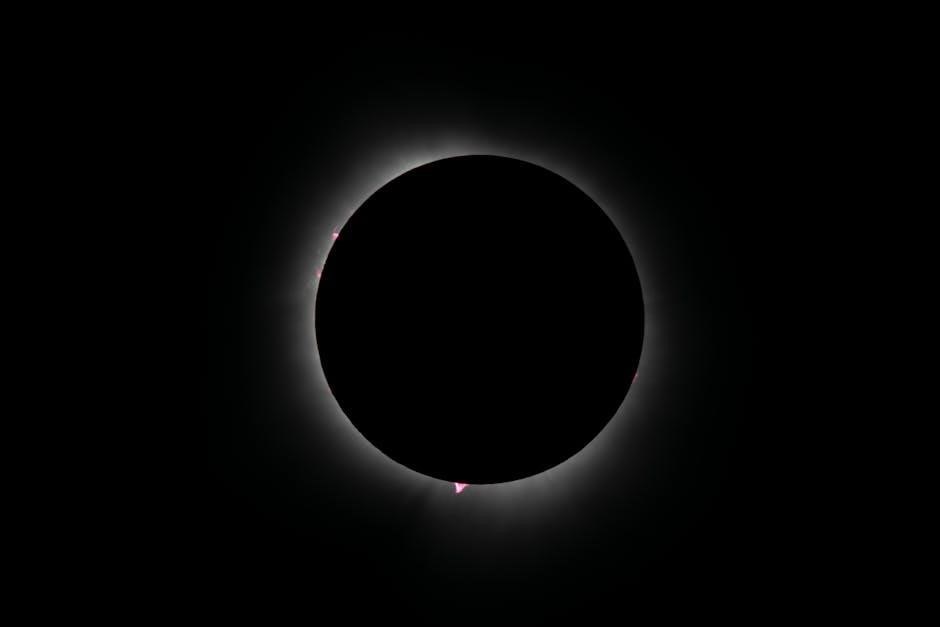Annie Dillard’s “Total Eclipse” is a captivating essay that masterfully blends personal narrative with philosophical musings, offering a profound reflection on the 1973 solar eclipse.
1.1 Overview of the Essay
Annie Dillard’s “Total Eclipse” is a lyrical and deeply introspective essay recounting her experience of witnessing a solar eclipse in 1973. Blending vivid imagery with philosophical reflections, Dillard explores themes of nature’s power, human existence, and the universe’s vastness. Her unique prose captures the awe and terror of the event, offering readers a profound meditation on life, mortality, and the search for meaning. The essay remains a masterpiece of contemporary literature.
1.2 Historical Context of the Total Eclipse
Annie Dillard witnessed the total solar eclipse on July 20, 1963, in the Sahara Desert, a rare and awe-inspiring event. This eclipse was significant for its scientific observation and cultural impact, drawing people worldwide. Dillard’s experience during this celestial phenomenon deeply influenced her writing, shaping her reflections on nature, humanity, and the cosmos. The event’s historical backdrop underscores its rarity and transformative power, captured vividly in her essay.

Literary Significance of “Total Eclipse”
Annie Dillard’s essay is a masterpiece of lyrical prose, blending themes of nature, human existence, and the universe with profound philosophical depth, showcasing her unique narrative style and intellectual rigor.
2.1 Themes and Motifs in the Essay
Annie Dillard’s “Total Eclipse” explores universal themes such as the fragility of human existence, the majesty of nature, and the search for meaning. The eclipse serves as a metaphor for transient life and cosmic indifference, while motifs of light and darkness symbolize the duality of existence. These elements weave together to create a profound meditation on humanity’s place in the universe.
2.2 Symbolism in the Total Eclipse
The total eclipse in Dillard’s essay is a powerful symbol of the universe’s vastness and humanity’s smallness. The sudden darkness represents cosmic indifference, while the sun’s corona embodies transcendent beauty. The eclipse symbolizes transformation and ephemeral life, contrasting human predictability with nature’s unpredictability, creating a profound existential moment for the narrator and readers alike.

Structure and Narrative Style
Dillard’s essay employs a lyrical, philosophical tone, blending vivid imagery with introspection. Her narrative weaves personal observation with cosmic reflections, creating a unique, immersive experience for readers;
3.1 Dillard’s Unique Writing Approach
Annie Dillard’s writing in “Total Eclipse” is marked by lyrical prose and a blend of personal narrative with philosophical reflection. She employs vivid imagery and poetic language to convey the awe-inspiring experience of the eclipse, while her introspective tone draws readers into her emotional and intellectual journey. Dillard’s ability to weave scientific observation with existential musings creates a unique narrative voice that captivates and challenges readers.
3.2 The Use of Imagery and Descriptions
Dillard’s vivid imagery in “Total Eclipse” transports readers to the moment of the eclipse, using striking descriptions of the sun’s disappearance and the sudden arrival of night. Her rich, evocative language paints the landscape in eerie light, while metaphorical comparisons elevate the scene to a universal, almost spiritual experience. These techniques create a powerful sensory connection and deepen the essay’s emotional impact.

Themes and Symbolism
Annie Dillard’s “Total Eclipse” explores themes of nature’s awe-inspiring power, human vulnerability, and existential wonder, using the eclipse as a symbol of life’s fleeting nature and cosmic mystery.
4.1 The Concept of Nature and the Universe
Dillard’s essay portrays nature as both majestic and indifferent, emphasizing the universe’s vastness and humanity’s smallness. The eclipse symbolizes nature’s overwhelming power, challenging human attempts to control or comprehend it, while evoking a deep sense of awe and existential reflection in the face of cosmic phenomena.
4.2 Human Existence and Mortality
Dillard’s “Total Eclipse” profoundly explores human existence and mortality, using the eclipse as a metaphor for life’s transient nature. The event underscores the universe’s indifference to human endeavors, evoking awe and fear. Dillard reflects on the fragility of life and the existential questions it raises, highlighting humanity’s struggle to find meaning in an vast, often incomprehensible cosmos.
Annie Dillard’s Background
Annie Dillard, born in 1945 in Pittsburgh, Pennsylvania, is a Pulitzer Prize-winning author known for her lyrical and philosophical prose, as seen in Pilgrim at Tinker Creek.
5.1 Biography of Annie Dillard
Annie Dillard, born on April 30, 1945, in Pittsburgh, Pennsylvania, grew up in a family that valued education and creativity. She developed a passion for literature and nature early in life, which deeply influenced her writing. Dillard attended Hollins College, where she earned her undergraduate and graduate degrees. Her work often explores themes of spirituality, nature, and human existence, earning her a Pulitzer Prize for Pilgrim at Tinker Creek in 1975.
5.2 Her Contributions to American Literature
Annie Dillard’s work has profoundly shaped American literature, blending lyrical prose with philosophical inquiry. Her Pulitzer Prize-winning Pilgrim at Tinker Creek redefined nature writing, while essays like “Total Eclipse” showcased her ability to merge personal narrative with universal themes. Dillard’s unique voice and exploration of spirituality, nature, and human existence have inspired generations of writers and readers, solidifying her legacy as a literary icon.

Cultural and Historical Impact
Annie Dillard’s “Total Eclipse” has left a lasting impact on American literature and culture, redefining how we perceive nature and existence. Its influence extends beyond literature, inspiring scientific and philosophical contemplation, while its vivid imagery continues to resonate with readers, cementing its place in cultural history.
6.1 Reception of “Total Eclipse” Upon Publication
Upon its release, “Total Eclipse” garnered widespread acclaim for its lyrical prose and profound insights. Critics praised Dillard’s ability to weave personal experience with cosmic wonder, making the essay a standout in literary circles. Readers were captivated by her unique voice, leading to the essay’s popularity and recognition as a seminal work in contemporary American literature.
6.2 The Essay’s Influence on Modern Literature
“Total Eclipse” has profoundly influenced modern literature, particularly in the realm of creative nonfiction. Its unique blend of personal narrative and philosophical reflection has inspired countless writers to explore similar themes. The essay’s vivid imagery and lyrical prose have set a benchmark for literary excellence, making it a foundational text in contemporary writing and a model for aspiring authors to emulate.

The Total Eclipse Experience
Annie Dillard’s “Total Eclipse” vividly captures the awe-inspiring experience of witnessing a solar eclipse, blending scientific observation with deeply personal and emotional reflections on nature’s grandeur.
7.1 Dillard’s Personal Experience During the Eclipse
Annie Dillard’s personal experience during the 1973 total solar eclipse is vividly recounted, capturing her awe and transformation. She describes the sudden darkness, the appearance of stars, and the eerie beauty of the corona. The event evokes a mix of excitement and existential dread, leaving her with a profound sense of the universe’s vastness and humanity’s smallness, reshaping her perception of reality forever.
7.2 The Emotional and Psychological Impact
Dillard’s experience of the total eclipse evokes profound emotional and psychological shifts. The sudden darkness and celestial spectacle inspire awe, fear, and existential reflection. The event confronts her with the universe’s vastness, triggering a mix of terror and wonder. This encounter reshapes her perspective, leaving her with a heightened sense of life’s fragility and beauty, profoundly influencing her inner world and worldview.

The Role of Nature in the Essay
Nature is central to Dillard’s narrative, symbolizing both beauty and terror. The eclipse embodies the universe’s power, evoking awe and existential reflection, highlighting humanity’s smallness within cosmic grandeur.
8.1 Nature as a Central Theme
Nature is a central theme in Dillard’s “Total Eclipse,” as the solar eclipse symbolizes the universe’s immense power and mystery. Dillard vividly depicts the natural phenomenon, evoking awe and terror, while exploring humanity’s fragile existence within the vast cosmos. Her lyrical prose captures the eclipse’s transformative impact, blending scientific observation with poetic insight to reveal nature’s profound influence on human perception and understanding of the world.
8.2 The Eclipse as a Natural Phenomenon
Dillard’s “Total Eclipse” vividly captures the solar eclipse as a rare celestial event, blending scientific detail with poetic imagery. The essay conveys the awe-inspiring spectacle of the moon eclipsing the sun, plunging the world into sudden darkness. Through precise descriptions, Dillard illustrates the eclipse’s natural beauty, its fleeting nature, and its profound effect on the environment, emphasizing its role as a reminder of the universe’s unpredictable and fascinating order.

Philosophical Implications
Dillard’s essay explores existential themes, questioning human existence and the universe’s vastness. The eclipse symbolizes impermanence, challenging perceptions of time, space, and cosmic reality.
9.1 Existential Reflections in the Essay
Annie Dillard’s “Total Eclipse” delves into profound existential reflections, exploring the meaning of life and human existence. The eclipse serves as a metaphor for the transient nature of life, prompting Dillard to contemplate the universe’s vastness and humanity’s place within it. Her experience underscores the fleeting nature of human understanding and the cosmic forces beyond human control, evoking a sense of awe and existential humility.
9.2 The Search for Meaning in the Universe
Dillard’s essay profoundly explores the search for meaning, using the eclipse as a catalyst for cosmic introspection. The sudden darkness awakens a primal awareness of the universe’s vastness, prompting reflections on human existence and the quest for understanding. The essay captures the paradox of seeking meaning in an indifferent yet awe-inspiring universe, highlighting the human spirit’s enduring curiosity and philosophical inquiry.

Teaching “Total Eclipse” in Classrooms
Dillard’s essay is a valuable educational tool, inspiring critical thinking and deep reflection. It encourages students to explore themes of nature, existence, and the human condition, fostering meaningful discussions and analytical skills in literature classes, while also enriching curriculum design with its rich philosophical and emotional depth.
10.1 Educational Value of the Essay
“Total Eclipse” offers immense educational value, serving as a rich text for teaching literary analysis, creative writing, and interdisciplinary studies. Its vivid imagery, philosophical depth, and personal narrative provide students with a multifaceted resource to explore themes such as nature, existence, and human perception. The essay’s lyrical prose and emotional resonance make it an excellent tool for fostering critical thinking and analytical skills in classroom settings.
10.2 Discussion Topics for Students
Dillard’s essay invites students to explore themes like the intersection of nature and humanity, the psychological impact of awe-inspiring events, and the role of personal experience in shaping understanding. Discussions can also focus on the essay’s narrative structure, its use of imagery, and how it challenges traditional scientific explanations of natural phenomena, fostering deeper engagement with both literature and science.
The PDF Version’s Popularity
The PDF version of “Total Eclipse” is widely sought after for its accessibility and convenience, making Annie Dillard’s profound essay easily shareable and readable across digital platforms worldwide.
11.1 Accessibility of the Essay in Digital Format
The PDF version of “Total Eclipse” enhances accessibility, allowing readers to engage with Dillard’s work anytime, anywhere. Digital formats ensure the essay reaches a global audience, facilitating easy sharing and reading on various devices. This accessibility has contributed significantly to its popularity and widespread distribution, making the essay more approachable for modern readers while preserving its intellectual depth and emotional impact.
11.2 Reasons for Its Wide Distribution Online
The essay’s wide online distribution stems from its timeless themes and Dillard’s lyrical prose, resonating with diverse audiences. The PDF format’s ease of sharing, coupled with academic recommendations, has amplified its reach. Additionally, the essay’s relevance in literary and philosophical discussions drives its popularity, making it a frequently sought-after resource for students, scholars, and enthusiasts exploring existential and natural themes.

Critical Analysis and Reviews
Annie Dillard’s “Total Eclipse” is widely acclaimed for its emotional depth and philosophical insights, with critics praising its vivid imagery and existential themes, though some find its intensity overwhelming.
12.1 Scholarly Interpretations of the Essay
Scholars interpret “Total Eclipse” as a meditation on human existence, nature, and spirituality. Dillard’s vivid imagery and philosophical reflections evoke existential themes, exploring the sublime and the fleeting nature of human experience. Her lyrical prose invites readers to contemplate the universe’s vastness and humanity’s place within it, making the essay a profound literary and philosophical work. The text’s depth has led to diverse critical analyses, enriching its academic and cultural significance.
12.2 Common Praise and Criticisms
Annie Dillard’s “Total Eclipse” is widely praised for its lyrical prose and profound philosophical insights. Critics commend its ability to merge personal experience with universal themes, creating a deeply immersive narrative. However, some argue that the essay’s dense style and intense focus on individual reflection may limit its accessibility for casual readers, sparking debates about its balance of form and content.
Personal Reflections and Insights
Annie Dillard’s “Total Eclipse” is a memoir of self-discovery, weaving her personal journey with the cosmic event. It explores the emotional and existential impact of witnessing a rare phenomenon, offering profound reflections on life, nature, and human existence through her vivid storytelling and introspective lens.
13.1 Dillard’s Personal Growth Through the Experience
Annie Dillard’s encounter with the total eclipse profoundly shaped her worldview. The awe-inspiring event transformed her perception of nature and existence, fostering a deeper appreciation for life’s fragility. This experience not only enriched her writing but also deepened her philosophical insights, reflecting her growth as both a writer and a thinker.
13.2 Reader Responses and Reactions
Annie Dillard’s “Total Eclipse” evokes powerful responses, inspiring awe and introspection.
Readers often describe feeling a profound connection to the universe, while others reflect deeply on human existence.
The essay’s vivid imagery and philosophical depth resonate emotionally, sparking personal growth and intellectual engagement.
Many find it a transformative experience, enriching their perspective on nature and life.
Resources for Further Reading
Explore Annie Dillard’s works, like Pilgrim at Tinker Creek. Find guides and scholarly reviews on JSTOR and Google Scholar. Use LitCharts and SparkNotes for study resources.
14.1 Recommended Books and Articles on the Topic
For deeper insights, read Dillard’s Pilgrim at Tinker Creek and Holy the Firm. Scholarly articles on JSTOR and Google Scholar offer critical analyses. LitCharts and SparkNotes provide study guides.
14.2 Online Resources and Analysis
Explore online platforms like LitHub and The Paris Review for in-depth analyses. Websites such as The Poetry Foundation offer insightful essays. Additionally, educational forums and blogs provide diverse perspectives, enriching your understanding of Dillard’s work.
Annie Dillard’s “Total Eclipse” is a Masterpiece of lyrical prose, offering profound insights into nature, human existence, and the cosmos, leaving a lasting literary legacy.
15.1 Final Thoughts on the Essay’s Significance
Annie Dillard’s “Total Eclipse” transcends a mere observational account, becoming a meditation on existence, nature, and human perception. Its lyrical prose and philosophical depth resonate deeply, making it a timeless piece in American literature. The essay’s ability to merge personal experience with universal themes ensures its enduring relevance and impact on readers.
15.2 The Lasting Legacy of “Total Eclipse”
Annie Dillard’s “Total Eclipse” remains a landmark in creative nonfiction, celebrated for its lyrical prose and profound exploration of human existence. Its influence on modern writers is undeniable, inspiring a generation to merge personal narrative with universal themes. The essay’s enduring relevance lies in its ability to evoke both emotional and intellectual resonance, solidifying its place as a timeless classic in American literature.
